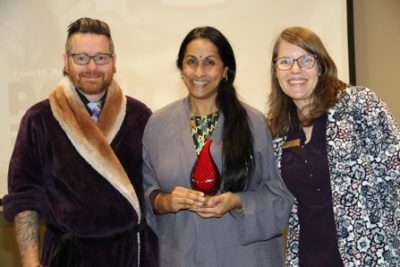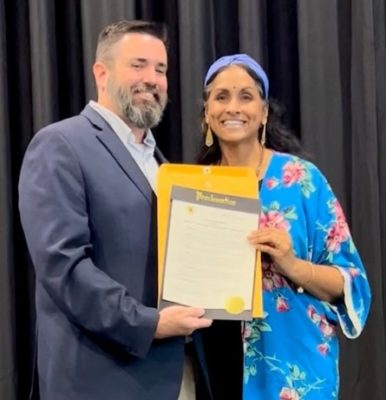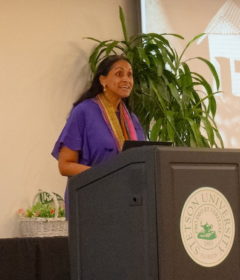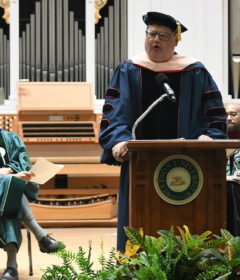Professor of Equity, Champion of Housing Justice

In Washington D.C., at the Housing Justice Leadership Conference in fall 2023, Rajni Shankar-Brown, PhD, was — once again — honored for her work. The professor and Jessie Ball duPont Distinguished Chair of Social Justice Education, Stetson alumna (MBA 2023), and internationally acclaimed social and environmental justice educator, scholar, public policy shaper, activist, author and artist, received the Michael Stoops Leadership Award.

The award, named after a longtime advocate of ending homelessness, recognizes an individual or organization that has made significant contributions while providing national leadership and service in the field of housing justice. Also, the award honors recipients for making meaningful and enduring lifetime contributions to human rights.
Shankar-Brown has been, and continues to be, a trailblazer. According to the awards committee, she “was the perfect candidate for the Michael Stoops award.”
The committee’s view: Shankar-Brown is not only the dynamic leader, now serving a second elected term as president of the board of directors for the National Coalition for the Homeless (NCH), but also is the appointed co-lead of Equity for the Office Housing and Urban Development (HUD), and a transformative leader in social and environmental justice. In addition, she leads an annual poverty and homelessness conference at Stetson that has been established as a national model with substantial visible impact. Further, she has designed civil and human rights movements, engaged in and built cross-collaborative partnerships, and created systems change that centers equity and sustainability.
With Michael Stoops, she is in esteemed company. Stoops, a social worker and activist, was a founding member of the National Coalition for the Homeless (NCH) and served as the executive director of NCH from 2004 until the time of his passing on May 1, 2017, following a long illness and stroke. Stoops was also a founding member of the North American Newspaper Association and Street Sense, which was established in 2003 in Washington, D.C., and has since expanded to cities across the world using a range of media platforms to raise awareness and spotlight solutions to homelessness in our community.

Stoops initially worked as a counselor for Vietnam Veterans but quickly became connected to issues of homelessness. His work was rooted in community organizing with the belief that housing is a human right, and he inspired thousands to work toward housing justice.
Megan Hustings, the NCH’s deputy director, described Stoops as a “superhero.”
Shankar-Brown joined the NCH board when Stoops was in leadership. In alignment with him, she is a visionary and charismatic servant-leader and change maker — mentoring advocates nationwide, and, in her own words, “marching with love and intention for social change and justice.”
Shankar-Brown describes Stoops as a “phenomenal and tireless civil and human rights advocate who continues to motivate her, and whose incredible efforts have created lasting change for many communities and individuals.”
“It is an honor to receive this award, particularly because of Michael Stoops and his legacy,” she says. “Michael was courageous and compassionate force in our world, tirelessly working to fight the violence of poverty.”
In the late 1980s, Stoops camped alongside fellow advocate Mitch Snyder for more than five months during winter as a protest, with Congress eventually passing the Stuart McKinney grant program and helping to establish the McKinney-Vento Homeless Assistance Act. It was the first significant federal legislative response to homelessness and remains the largest federal response to homelessness through services and programs, and now also provides rights and services to children and youth experiencing homelessness. Stoops also developed the “You Don’t Need a Home to Vote Campaign,” which won state legislative changes nationwide to ensure people without a residence could participate in elections and legally vote.
As influencers in her continued journey, Shankar-Brown points to Stoops and mentors such as Congressman John Lewis and author, theorist, educator Gloria Jean Watkins (better known by her pen name, Bell Hooks). Also, she points to famous freedom activist Mahatma Gandhi, who her Thatha (grandfather) worked with as a journalist, along with her lifelong No. 1 role model, her Amma (mom).
‘Compassionate, Insightful and Impactful Leader’

Donald Whitehead, executive director of the National Coalition for the Homeless, noted that Shankar-Brown is a visionary leader who walks in purpose with incredible talent, passion and expertise, and has a heart of gold.
“Dr. Shankar Brown is a compassionate, insightful and impactful leader who governs with empathy, authority, wisdom and fairness,” states Whitehead, also a veteran, congressional adviser and Emmy Award winner. “She has been at the forefront of the movement to include people with lived experience in the pursuit of ending homelessness, and there is no one in the country who is as deserving as Dr Shankar Brown.”
The People’s Progressive Caucus of Miami-Dade describes Shankar-Brown as an “inspiring voice” and a “champion for racial justice,” citing her dedication and expertise to ending the criminalization of homelessness in Florida and beyond.
In recent years, Shankar-Brown has actively helped transform the process for the development and creation of innovative approaches to housing solutions and in cross-agency partnerships. With the U.S. Office of Housing and Urban Development, she helped to advocate for vital resources and more than $315 million in grants in 2023 to support communities with growing individuals and families unsheltered, including children and elderly.
In 2024, she continues to lead equity efforts, shining a light on pathways to build more inclusive communities and a just society.
Local Activism
In addition to her tireless efforts for equity and justice nationally and globally, Shankar-Brown remains active locally — firmly believing in the importance of local activism. For Shankar-Brown, community and civic engagement are not extracurriculars or side enrichments but remain central to all her work and intentionally prioritized.

Her character and efforts earned her the Love Local Award from The Neighborhood Center of West Volusia, considered to be one of the most prestigious local awards.
“This award is beyond special,” Shankar-Brown notes. “The Neighborhood Center is a vital heartbeat in our community and positively touches lives each day by providing essential shelter, food, services, and helping to prevent homelessness,” Shankar-Brown shares.
Notably, Savannah-Jane Griffin, the center’s CEO, is a Stetson alumna who previously served as Stetson’s executive director of Community Engagement and Inclusive Excellence (plus other roles) for 15 years.
In addition, last June Shankar-Brown was recognized at the 2023 Poverty and Homelessness Conference at Stetson by DeLand Mayor Chris Cloudman with a proclamation for transformative leadership in the community and the founding of the Institute for Catalyzing Equity, Justice, and Social Change. It was her second proclamation by the City of DeLand; the first was in 2019 by then-Mayor Bob Apgar.

Also, at last year’s annual Robed in Love event in DeLand, she received the Love Local Award.
Such awards, says Shankar-Brown, “hold significant meaning and connective vitality” as she strives “to live each day with intention.”
“’Loving local’ is rewarding on so many levels and in my perspective, often the most meaningful and impactful activism,” she continues.
Shankar-Brown has participated in Robed in Love since its inception and helped to raise large financial donations for the Neighborhood Center and local family and youth emergency housing services for several years. Those efforts come alongside her love and life partner, Benjamin Brown, whom she met as a first year student at George Mason University nearly three decades ago.

Brown is director of online learning and educational technology at Stetson. Their children are Valen Siddhartha, a second-year student at Stetson; Romila Sitara, an eight-grader at Southwestern Middle School in DeLand; and “adopted” daughter Zoë Star (Valen’s longtime girlfriend), a student at Daytona State College.
Shankar-Brown encourages everyone to participate in this year’s Robed in Love community event, scheduled for Feb. 16 in DeLand. Shankar-Brown will share an original spoken-word poem and inspiring words, as well as serve as Master of Ceremonies.
Her passion and purpose also carry into the classroom at Stetson. Each of Shankar-Brown’s undergraduate and graduate courses intentionally includes community engagement and encourage local and global activism.
“We are the people,” she avows and reminds her students. “And we must work together to bend the arc toward justice with fierce love, intention and persistence.”
Similarly, as a faculty member of the International Experiential Education’s experiential education academy, she helps faculty and staff at institutions of higher education and K-12 school nationwide and overseas to design experiential education courses that center on equity, diversity and inclusion.
Now in 2024, that purpose remains unchanged — focused on promoting human and civil rights locally, nationally and around the globe. That means moving beyond talk and walking the walk every day.
For Shankar-Brown, this is not a job, but life’s work.
“I am generally up well before sunrise and often end my day with the moon and stars, and feel grateful to live life on purpose,” she concludes.
Note: Rajni Shankar-Brown, PhD, has another message: You can help, too. In addition to supporting the Neighborhood Center locally near the Stetson campus, she encourages individuals who may have the means to donate to the National Coalition for the Homeless, the oldest national advocacy organization focused on ending homelessness in the United States, and/or consider making NCH a bequest in their will or living trust.



